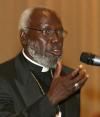Issue Date: December 26, 2003
Bishop urges international community to press for just accord By DENNIS CODAY Sudan this Christmas may experience peace on earth. A 20-year bloody civil war, described by the Catholic bishop of Torit, Sudan, as a “holocaust,” appeared to be drawing to a close in the third week of December. Bishop Paride Taban of the Torit diocese told NCR in a late November interview that he is optimistic a peace agreement can be signed, as long as “the international community remains firm.” Nearly 2.5 million people have died and 4.5 million people have been displaced by the civil war that has pitted the Islamic northern part of the country against rebel forces in the south, which is largely populated by Christians and followers of traditional religions. Under cover of a cease-fire declared last year, Sudanese government representatives have been in neighboring Kenya negotiating a long-term peace settlement with the Sudan People’s Liberation Movement/Army. Officials in the U.S. State Department, which has actively supported the peace negotiations, said they were optimistic a peace agreement could be reached before Christmas. As of press time Dec. 18 reports were using the phrase “end of the year” as a target for achieving an agreement. Acting Assistant Secretary for African Affairs Charlie Snyder told a press briefing Dec. 10, “The parties are down to maybe two issues that separate them, both of which will require political will to compromise on, but it’s not the kind of fundamental difference, a gap that they can’t breach if they really are willing to be partners.” “The war in the Sudan is religious, ethnic and economic,” said Taban, 66. Since independence in 1956, the Khartoum government has tried to impose an “Arabization” and “Islamization” on the black African, Christian southern half of the country, the bishop said. As part of these programs, Christian missionaries were expelled, schools closed, Bibles and books written in Roman script were burned, and intellectuals were killed, Taban said. The final straw came in 1983 when the Khartoum government imposed sharia, Islamic law, on all regions of the country. That sparked the armed separatist movement in the south. Taban added, “Because the south is the richest in minerals, especially oil, the program of the Islamic fundamentalist government in the north was to separate the people of the south from their lands.” Sudan earns about $580 million a year in oil revenues. According to the report “Sudan, Oil and Human Rights” by Human Rights Watch, more than 60 percent of the money goes to buy arms for the military. The peace agreement under negotiation will allow the southern half of the country autonomous rule for six years and then a referendum on self-determination. According to reports from Washington and Kenya, one of the sticking points holding up the negotiations is how to divide the oil revenues between the central government and an autonomous south. Asked how U.S. citizens can help the people of Sudan, Taban said political pressure was now more crucial than development aid. “We want peace,” he said. “The struggle is to bring a just and lasting peace to the people in Sudan. … USAID is giving food. The United Nations is airdropping food to remote places. Catholic Relief [Services] is giving food. But to give food is like fattening cattle to be slaughtered tomorrow.” Taban said that in the south only places where companies are extracting oil are settled. “If you see now the southern Sudan, it is just as God created it; no human hand has touched it. No schools, no hospitals, no roads. … You can’t believe your eyes,” the bishop said. But he said development will come when people are given their human rights, the right to self-determination and freedom of speech. Taban said the cease-fire has held a year because pressure from the United States has kept an arms embargo operating. Before last year, the bishop said, “we were being bombed nearly every day for such a long time.” The constant bombing turned people into nomads, he said. “You can’t believe how they are able to live,” he said. “They have no money. They have no food. No way to store food. They depend on what Catholic Relief or the World Food Program can bring. They live by rations. Where there is no road, the food is airdropped and this is distributed by the families. Sometimes children go without food for one or two days. “Displaced by war, the people moved from place to place, and the church moves with them,” he said. “The church is actually everything for the people. There is no government. The church is the hope of the people. The question of roads and water are all problems addressed by the church.” Dennis Coday is an NCR staff writer. His e-mail address is dcoday@ncronline.org.
National Catholic Reporter, December 26, 2003 |
